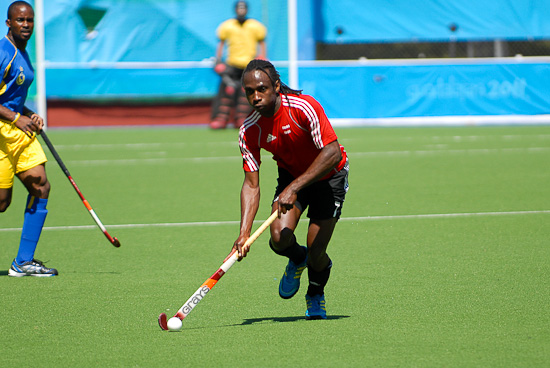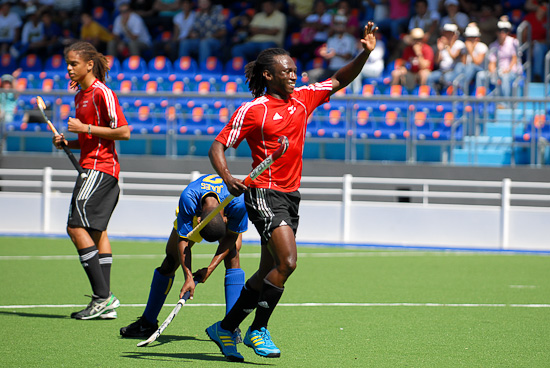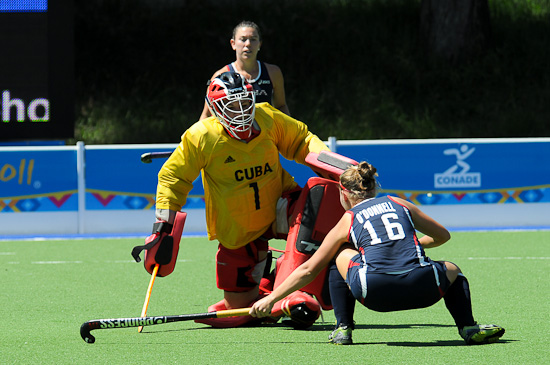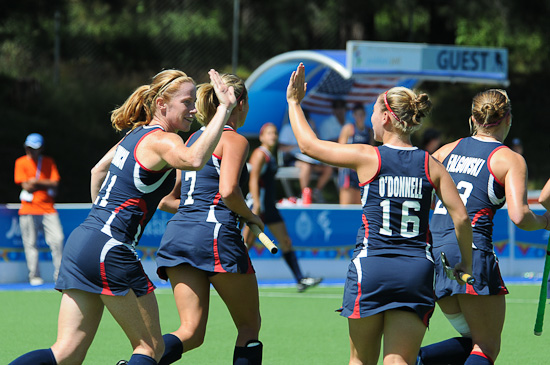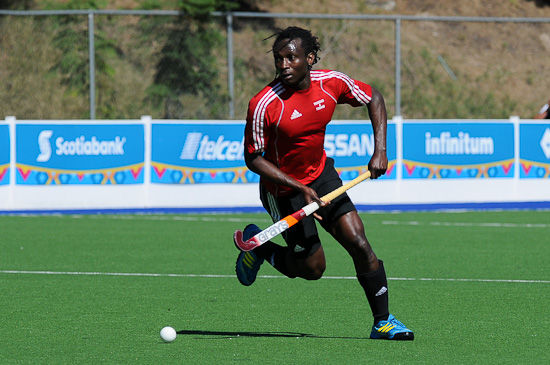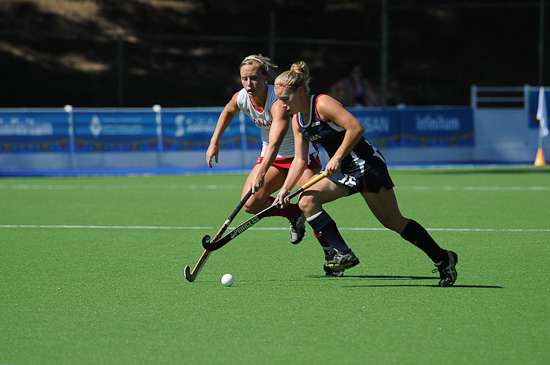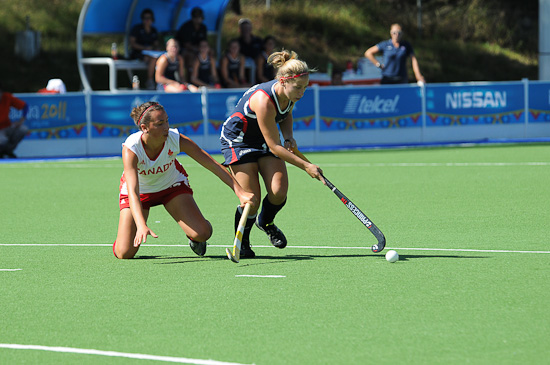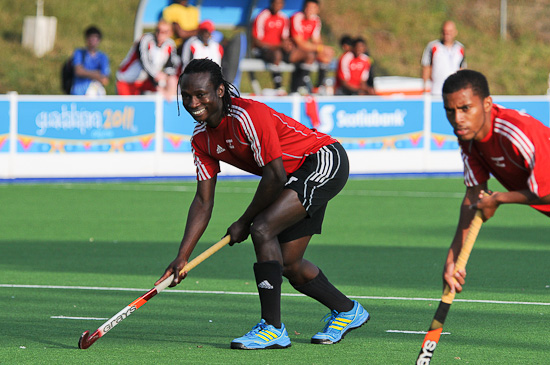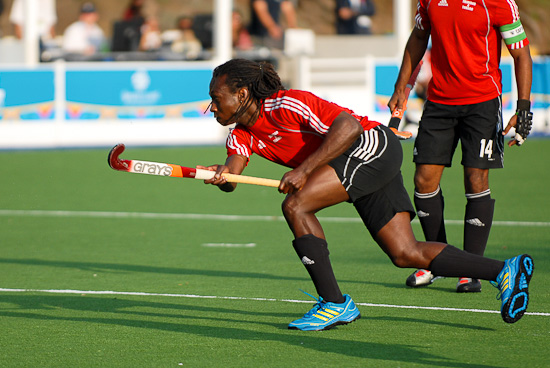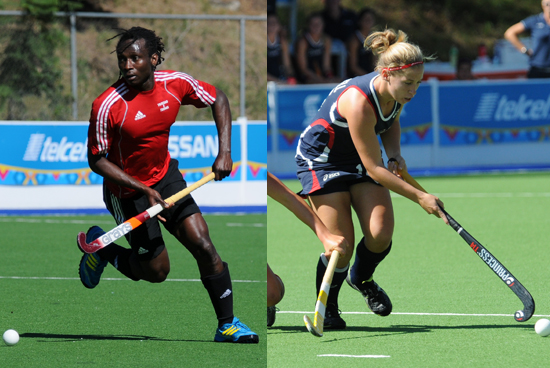
Katie O’Donnell is fast turning into one of the most feared strikers on the women’s hockey scene. Nicknamed ‘the Burglar’ by other nations, the USA athlete pops up to slot the ball home with unerring regularity and, most recently, was on target again as her team beat Pan American rivals Argentina in a convincing 3-0 win at the Hawkes Bay Eight Nations hockey tournament in New Zealand.
The victory over Argentina is good timing for the USA team as it is extremely likely to meet Argentina twice in as many months – firstly at the Hockey World League Semi Finals and then in the Pan American Games. This victory will give the team great confidence going into these important encounters.
Like all the athletes currently playing for Team USA, O’Donnell, or “O’D” as she is commonly known within the squad, talks of the strong team bond that the players have and, while other sides may talk glowingly about their team work and the strong friendships within their squad, with the USA, you get the feeling that this is the very core of their ethos. Talk to any USA athlete about why the team has progressed in the past few years and the answer is unequivocal – it’s down to the collective strength and hard work of the squad.
One man who knows just how important it is for a team to work together is Trinidad and Tobago’s Kwan Browne. Unlike Team USA, who train together every day, Browne and his team are spread all over the world and can only get together for intensive training periods every so often. But Browne, who has played more than 300 times for Trinidad and Tobago, is ever optimistic about his team’s chances in the Pan Am Games and, with his own hockey pedigree and coaching excellence having a huge influence on his team, there is no doubt that Trinidad and Tobago will be mixing it with the bigger teams right to the final whistle.
Despite Trinidad and Tobago’s relatively lowly position as 29th ranked team in the world, Browne himself is a living legend in hockey circles. In the UK, he is the England U21 Assistant Coach and head coach for National League premier division side, Canterbury and in 2012/13 he won the award for England Hockey High Performance Coach of the Season.
Browne has been the mainstay of the national team for more than 18 years, playing in four Commonwealth Games as well as four Pan American Games and three Pan American Cup competitions. This year’s Pan American Games will be his last, and also his last chance to help his team secure that most treasured of things, a place at the 2016 Olympics.
He talks of how hockey in Trinidad and Tobago has developed over the past two decades. “I was the first male player to leave the country on a scholarship to play and study in England. I had a successful first year coaching my university side and playing in the England Premier League,” he says.
“As a result, the university offered a scholarship to another Trinidad and Tobago player, which was also successful. The following year, three scholarships were offered. This meant that from the time I got my first cap to just five years later, Trinidad and Tobago had seven players studying and playing at a very high level in England. This transformed the level of the national side as we all learnt a lot and were able to bring new ideas back home. We then qualified for the Indoor World Cup in Vienna and were able to attract some of the top Dutch national coaches. The knowledge these coaches imparted meant that we developed technically, tactically and mentally.”
As hockey knowledge flowed into the country, so the players began to flow out. As well as England, Browne’s national team mates were now playing in Spain and Germany and other parts of Europe. However, the growth in the sport also attracted the attention of the Trinidad and Tobago government who invested money into hockey, meaning the national squad was able to come together more frequently for training and travel the world to play against some of the best countries.
Browne’s coaching commitments in the UK has meant he needs to plan his time carefully. “Because our international tournaments are normally in the summer, it doesn't regularly affect my club commitments. However, the last year has been challenging as I have been working as the assistant coach for England U21 Men and the England Senior Men Development squad and we have quite a few camps and tournaments during the year. Early planning has been crucial so I will arrange to go back to Trinidad and Tobago where possible and do intensive camps over 10 days.”
The fact that Browne is working with another national team has had added benefits for the Trinidad and Tobago team as Browne explains: “I am able to keep up to date with the new developments and when we have the intensive camps I am able to pass on the things I have learnt. Occasionally the Trinidad and Tobago national coach will come over to England for three to four months and spend time looking at the Premier League and gathering information from some of the coaches.”
The biggest hurdle that Trinidad and Tobago faces is the inconsistency of government funding, which makes it difficult to do any long term planning. “When we had consistent funding our ranking jumped to 18th, we were doing really well and were hoping to get into the top 15. With funding, players can receive a stipend and have some of their travelling expenses covered. While the players did not earn money, this was enough to play and train hard,” says Browne.
“However, now that the funding is a bit ad hoc, players are forced to get full time jobs, so getting time off is a massive problem. We haven't got thousands of players to choose from, so if a few key players are missing from a tournament it has a massive impact on our quality. The Pan Am Games in July will be the first time in about eight years we will have all our players available, so we are all quite excited.”
Team USA are in a very different position to Trinidad and Tobago. The team trains together just about every day, and the squad members are full-time athletes. Speaking after the USA’s trip to New Zealand, O’Donnell explained why she feels the USA is now in a position to challenge any of the top teams in the world, starting with its Pan Am rivals. “Over the past 10 years, I have seen this team grow so much. We are continuously competing against the top ranked teams in the world, including our Pan American rival, Argentina. Over the past year we have tied them four times, lost once, and won twice. That record over the past year speaks for itself. We are striving to be number one on the American Continent.”
The USA has two chances to qualify for the 2016 Olympics this year. Firstly at the Hockey World League Semi Finals in Valencia, then at the Pan Am Games. “I wish I was a fortune teller so I could predict the outcome of these tournaments”, says O’Donnell, “But we are training our tails off so that we can be peaking at our two qualifying tournaments. And I prefer my seat where we have the ability to make our dreams come true.”
So what is it that has made the USA shoot up the world rankings from 11th in June 2014 to its current position of fifth in the world?
“Honestly I attribute all our strengths to a well-rounded group. We have some players who are crazy fast, seriously skilled, great communicators, and also players who can run for days. When you put us together we ultimately bring our personal strength, then feed off our teammates’ strengths. Because we train against each other every single day, you need to give every effort to match your teammates’ strengths, or you will struggle to succeed in training.”
When it comes to personal strengths, O’Donnell says she has developed tactically and technically in the past two years to the point where she now feels she is a senior player within the squad. “I feel my best strength is my pressing. We are an attacking team and if I can have a little part in helping us get the ball in order to attack I feel I am contributing to this team’s success.
